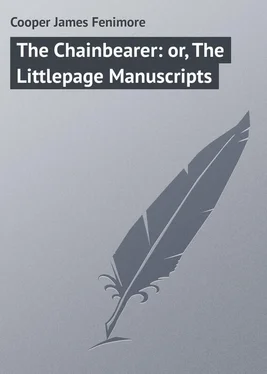James Cooper - The Chainbearer - or, The Littlepage Manuscripts
Здесь есть возможность читать онлайн «James Cooper - The Chainbearer - or, The Littlepage Manuscripts» — ознакомительный отрывок электронной книги совершенно бесплатно, а после прочтения отрывка купить полную версию. В некоторых случаях можно слушать аудио, скачать через торрент в формате fb2 и присутствует краткое содержание. Жанр: foreign_prose, на английском языке. Описание произведения, (предисловие) а так же отзывы посетителей доступны на портале библиотеки ЛибКат.
- Название:The Chainbearer: or, The Littlepage Manuscripts
- Автор:
- Жанр:
- Год:неизвестен
- ISBN:нет данных
- Рейтинг книги:5 / 5. Голосов: 1
-
Избранное:Добавить в избранное
- Отзывы:
-
Ваша оценка:
- 100
- 1
- 2
- 3
- 4
- 5
The Chainbearer: or, The Littlepage Manuscripts: краткое содержание, описание и аннотация
Предлагаем к чтению аннотацию, описание, краткое содержание или предисловие (зависит от того, что написал сам автор книги «The Chainbearer: or, The Littlepage Manuscripts»). Если вы не нашли необходимую информацию о книге — напишите в комментариях, мы постараемся отыскать её.
The Chainbearer: or, The Littlepage Manuscripts — читать онлайн ознакомительный отрывок
Ниже представлен текст книги, разбитый по страницам. Система сохранения места последней прочитанной страницы, позволяет с удобством читать онлайн бесплатно книгу «The Chainbearer: or, The Littlepage Manuscripts», без необходимости каждый раз заново искать на чём Вы остановились. Поставьте закладку, и сможете в любой момент перейти на страницу, на которой закончили чтение.
Интервал:
Закладка:
"You can hardly be serious in either case, I should hope, Mr. Newcome, but are pleased to exercise your ingenuity on us for your own amusement. There is nothing so particular in the covenants of your lease as to require any case of conscience to decide on its points."
"There's this in it, major, that you get the whull property back ag'in, if you choose to claim it."
"Claim it! the whole property has been mine, or my predecessors', ever since it was granted to us by the crown. All your rights come from your lease ; and when that terminates, your rights terminate."
"Not accordin' to my judgment, major; not accordin' to my judgment. I built the mills at my own cost, you'll remember."
"I certainly know, sir, that you built the mills at what you call your own cost; that is, you availed yourself of a natural mill-seat, used our timber and other materials, and constructed the mills, such as they are, looking for your reward in their use for the term of a quarter of a century, for a mere nominal rent – having saw-logs at command as you wanted them, and otherwise enjoying privileges under one of the most liberal leases that was ever granted."
"Yes, sir, but that was in the bargain I made with your grand'ther. It was agreed between us, at the time I took the place, that I was to cut logs at will, and of course use the materials on the ground for buildin'. You see, major, your grand'ther wanted the mills built desperately; and so he gave them conditions accordin'ly. You'll find every syllable on't in the lease."
"No doubt, Mr. Newcome; and you will also find a covenant in the same lease, by which your interest in the property is to cease in a few days."
"Wa-a-l, now, I don't understand leases in that way. Surely it was never intended a man should erect mills, to lose all right in 'em at the end of five-and-twenty years."
"That will depend on the bargain made at the time. Some persons erect mills and houses that have no rights in them at all. They are paid for their work as they build."
"Yes, yes – carpenters and millwrights, you mean. But I'm speakin' of no such persons; I'm speakin' of honest, hard-workin', industrious folks, that give their labor and time to build up a settlement; and not of your mechanics who work for hire. Of course, they're to be paid for what they do, and there's an eend on't."
"I am not aware that all honest persons are hard-working, any more than that all hard-working persons are honest. I wish to be understood that , in the first place, Mr. Newcome, phrases will procure no concession from me. I agree with you, however, perfectly, in saying that when a man is paid for his work, there will be what you call 'an end of it.' Now twenty-three days from this moment, you will have been paid for all you have done on my property according to your own agreement; and by your own reasoning, there must be an end of your connection with that property."
"The major doesn't mean to rob me of all my hard earnin's!"
"Mr. Newcome, rob is a hard word, and one that I beg may not be again used between you and me. I have no intention to rob you, or to let you rob me. The pretence that you are not, and were not acquainted with the conditions of this lease, comes rather late in the day, after a possession of a quarter of a century. You know very well that my grandfather would not sell, and that he would do no more than lease; if it were your wish to purchase, why did you not go elsewhere, and get land in fee? There were, and still are, thousands of acres to be sold, all around you. I have lands to sell, myself, at Mooseridge, as the agent of my father and Colonel Follock, within twenty miles of you, and they tell me capital mill-seats in the bargain."
"Yes, major, but not so much to my notion as this – I kind o' wanted this!"
"But, I kind o' want this, too; and, as it is mine, I think, in common equity, I have the best claim to enjoy it."
"It's on equity I want to put this very matter, major – I know the law is ag'in me – that is, some people say it is; but some think not, now we've had a revolution – but, let the law go as it may, there's such a thing as what I call right between man and man."
"Certainly; and law is an invention to enforce it. It is right I should do exactly what my grandfather agreed to do for me, five-and-twenty years ago, in relation to these mills; and it is right you should do what you agreed to do, for yourself."
"I have done so. I agreed to build the mills, in a sartain form and mode, and I done it. I'll defy mortal man to say otherwise. The saw-mill was smashing away at the logs within two months a'ter I got the lease, and we began to grind in four!"
"No doubt, sir, you were active and industrious – though, to be frank with you, I will say that competent judges tell me neither mill is worth much now."
"That's on account of the lease" – cried Mr. Newcome, a little too hastily, possibly, for the credit of his discretion – "how did I know when it would run out? Your gran'ther granted it for three lives, and twenty-one years afterward, and I did all a man could to make it last as long as I should myself; but here I am, in the prime of life, and in danger of losing my property!"
I knew all the facts of the case perfectly, and had intended to deal liberally with Mr. Newcome from the first. In his greediness for gain he had placed his lives on three infants, although my grandfather had advised him to place at least one on himself; but, no – Mr. Newcome had fancied the life of an infant better than that of a man; and in three or four years after the signature of the lease, his twenty-one years had begun to run, and were now near expiring. Even under this certainly unlooked-for state of things, the lease had been a very advantageous one for the tenant; and, had one of his lives lasted a century, the landlord would have looked in vain for any concession on that account; landlords never asking for, or expecting favors of that sort; indeed most landlords would be ashamed to receive them; nevertheless, I was disposed to consider the circumstances, to overlook the fact that the mills and all the other buildings on the property were indifferently built, and to relet, for an additional term of twenty-one years, woodlands, farms, buildings, and other privileges, for about one-third of the money that Mr. Newcome himself would have been apt to ask, had he the letting instead of myself. Unwilling to prolong a discussion with a man who, by his very nature, was unequal to seeing more than one side of a subject, I cut the matter short by telling him my terms without further delay.
Notwithstanding all his acting and false feeling, the 'squire was so rejoiced to learn my moderation that he could not but openly express his feelings; a thing he would not have done did he not possess the moral certainty I would not depart from my word. I felt it necessary, however, to explain myself.
"Before I give you this new lease, Mr. Newcome," I added, holding the instrument signed in my hand, "I wish to be understood. It is not granted under the notion that you have any right to ask it, beyond the allowance that is always made by a liberal landlord to a reasonably good tenant; which is simply a preference over others on the same terms. As for the early loss of your lives, it was your own fault. Had the infants you named, or had one of them, passed the state of childhood, it might have lived to be eighty, in which case my timber-land would have been stripped without any return to its true owner, but your children died, and the lease was brought within reasonable limits. Now the only inducement I have for offering the terms I do, is the liberality that is usual with landlords, what is conceded is conceded as no right, but as an act of liberality."
Читать дальшеИнтервал:
Закладка:
Похожие книги на «The Chainbearer: or, The Littlepage Manuscripts»
Представляем Вашему вниманию похожие книги на «The Chainbearer: or, The Littlepage Manuscripts» списком для выбора. Мы отобрали схожую по названию и смыслу литературу в надежде предоставить читателям больше вариантов отыскать новые, интересные, ещё непрочитанные произведения.
Обсуждение, отзывы о книге «The Chainbearer: or, The Littlepage Manuscripts» и просто собственные мнения читателей. Оставьте ваши комментарии, напишите, что Вы думаете о произведении, его смысле или главных героях. Укажите что конкретно понравилось, а что нет, и почему Вы так считаете.












